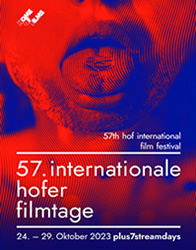Political Explosiveness and Humor
The absolute highlight of the 56th Hof International Film Festival came from the USA and was called THE MENU. The exclusive meal sequence that gives the film its title is served to an equally exclusive evening party and is the highlight of the life of a star chef played by Ralph Fiennes. What happens is sensational, shocking, breathtaking – and terribly funny.
Films with political explosiveness from current conflict and crisis areas underlined the importance of this year’s festival, whose motto was “Society – Change as Opportunity”. On view were INTO THE DARKNESS by Mariia Shevchenko from Ukraine, about the Russian invasion of her country, and two contributions from Iran, where women are currently making headlines with their struggle for freedom. In BI ROYA – WITHOUT HER, Arian Vazirdaftari vividly describes the repressive methods of the regime. In the short film NOGHREH, Donya Madani, who was only able to travel to Hof with great difficulty, deals with child labor in her country.
“But of course, the Hof International Film Festival, in its 56th edition, was, as always and rather more than usual, a festival of German film.”
The number of films “celebrated” in the literal sense of the word continues to grow. In 2022, no less than ten prizes were awarded. The oldest one, which has been presented since 1986 as the Award of the City of Hof, went to director Aelrun Goette, born in East Berlin in 1966, who participated in the festival in 2003 with DIE KINDER SIND TOT and subsequently with two more premieres. The German-German comedy OLAF JAGGER by Heike Fink, which was screened at the festival opening and starred the popular comedian Olaf Schubert, received two awards.
The festival is increasingly gaining a special character through its wide-ranging framework program initiated and personally supervised by the busy festival director Thorsten Schaumann, which in 2022 also benefited from the new “meeting place” at the Haus Bürgergesellschaft. This was the third time that the program was offered on a hybrid basis: Most of the films were not only shown in cinemas in Hof, but also online, giving the festival a previously hardly imaginable reach.
“What started as an emergency solution in 2020 during the Corona pandemic is now to become the new normal: Hof remains hybrid.”
The opening film of the 57th edition of the Hof International Film Festival was more eagerly awaited than ever before. No wonder, because with 15 YEARS, Chris Kraus continued the story of FOUR MINUTES, which thrilled festival audiences back in 2007. After serving a prison sentence for a murder she did not commit the pianist Jenny (Hannah Herzsprung) meets her former lover again, who was also her tormentor; a duel of life and death ensues. The film touched on one of the main themes of this festival – love and power struggles – which could be seen in numerous other films during the festival: from TWINS IN CRIME and FOUR LITTLE ADULTS to POWER OF LOVE and Detlef Bothe’s intense drama YOUR BEAUTIFUL HELL. The Irish-Finnish co-production MY SAYLOR, MY LOVE, in which a retired captain and his widowed housekeeper experience a late-in-life romance in a melancholy landscape, provided respite from such relationship problems.
“The 154 feature films, documentaries and short films also addressed highly political topics, including migration and exploitation, the climate crisis and environmental protection.”
The German Cinema New Talent Award went to Tuna Kaptan, whose feature film RAW MATERIALS revolves around a tragic accident in which an Albanian illegal worker dies; the Hof Critics Award for the Best Direction went to Robert Gwisdek for THE BOY WHO OWNS THE WORLD, an allegory of life in darkening times; the Friedrich Baur Gold Award, awarded in memory of festival founder Heinz Badewitz, went to the film THEN I’D RATHER DIE, in which Pauline Schläger deals sensitively with the reactions of young people to a friend’s suicide attempt.
The retrospective was dedicated to the successful German director Maria Schrader, while the Award of the City of Hof was awarded to the distributor, director and producer Stefan Paul, who has long been associated with the festival through his participation in the Saturday soccer matches, which the FC Filmtage team won 2:1 this time.
The festival management drew a positive balance at the end of this year’s edition, and what was particularly pleasing was that the number of visitors has risen again after the slump of the Corona years. The HoF PLUS program also attracted a lot of interest, especially the German premiere of the HoFXR project, which incorporated “extended reality”.
Ralf Sziegoleit, the author, is arts journalist.
For many years he was features editor at the daily Hof newspaper Frankenpost for which he has been reporting on the Hof IFF since 1967.


